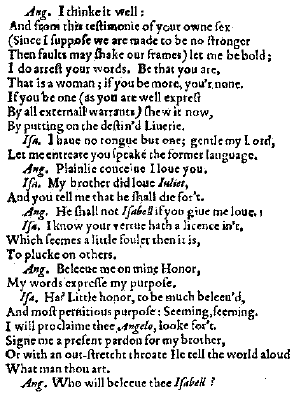|
|
ANGELO.
I think it well:
And from this testimony of your own sex
(Since I suppose we are made to be no stronger
Then faults may shake our frames) let me be bold;
I do arrest your words. Be that you are,
That is a woman; if you be more, you're none;
If you be one (as you are well express'd
By all external warrants) show it now,
By putting on the destined livery.
|
|
|
|
ISABELLA.
I have no tongue but one: gentle my lord,
Let me entreat you speak the former language.
|
|
|
|
ANGELO.
Plainly conceive I love you.
|
|
|
|
ISABELLA.
My brother did love Juliet,
And you tell me that he shall die for it.
|
|
|
|
ANGELO.
He shall not Isabel if you give me love.
|
|
|
|
ISABELLA.
I know your virtue hath a licence in't,
Which seems a little fouler than it is,
To pluck on others.
|
|
|
|
ANGELO.
Believe me on mine honor,
My words express my purpose.
|
|
|
|
ISABELLA.
Ha? little honor, to be much believed,
And most pernicious purpose: Seeming, seeming.
I will proclaim thee Angelo, look for't:
Sign me a present pardon for my brother,
Or with an outstretch'd throat I'll tell the world aloud
What man thou art.
|
|
|
|
ANGELO.
Who will believe thee, Isabel?
|
|
|
 |
